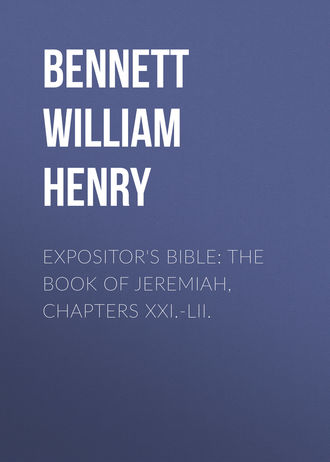 полная версия
полная версияExpositor's Bible: The Book of Jeremiah, Chapters XXI.-LII.
338
vi. 5.
339
xx. 5.
340
Tobit xii. 13: cf. ii.
341
xxv. 10.
342
ix. 11, x. 22.
343
xxv. 9, 10.
344
xxvi. 6.
345
xxiii. 40.
346
i. 10.
347
xiv. 8, xvii. 13.
348
Amos v. 18, 20.
349
xxxvii. 12 (R.V.).
350
1 Kings xxi. 3.
351
Lev. xxv. 25, Law of Holiness; Ruth iv.
352
2 Sam. xxiv. 24: cf. 1 Chron. xxi. 25, where the price is six hundred shekels of gold. It is scarcely necessary to point out that "threshing-floor" (Sam.) and "place of the threshing-floor" (Chron.) are synonymous.
353
By value here is meant purchasing power, to which the weight denoted by the term shekel is now no clue.
354
Gen. xxiii. (P.).
355
ἀνεγνωσμένον probably a corruption of ἀνεωγμένον.
356
The text varies in different MSS. of the LXX.
357
Cf. Cheyne, etc., in loco.
358
Verse 15 anticipates by way of summary verses 42-44, and is apparently ignored in verse 25. It probably represents Jeremiah's interpretation of God's command at the time when he wrote the chapter. In the actual development of the incident, the conviction of the Divine promise of restoration came to him somewhat later.
359
What was said of verse 15 partly applies to verses 17-23 (with the exception of the introductory words: "Ah, Lord Jehovah!"). These verses are not dealt with in the text, because they largely anticipate the ideas and language of the following Divine utterance. Kautzsch and Cornill, following Stade, mark these verses as a later addition; Giesebrecht is doubtful. Cf. v. 20 ff. and xxvii. 5 f.
360
xxv. 12, xxix. 10.
361
Vatke and Stade reject chapters xxx., xxxi., xxxiii., but they are accepted by Driver, Cornill, Kautzsch (for the most part). Giesebrecht assigns them partly to Baruch and partly to a later editor. It is on this account that the full exposition of certain points in xxxii. and elsewhere has been reserved for the present chapter. Moreover, if the cardinal ideas come from Jeremiah, we need not be over-anxious to decide whether the expansion, illustration, and enforcing of them is due to the prophet himself, or to his disciple Baruch, or to some other editor. The question is somewhat parallel to that relating to the discourses of our Lord in the Fourth Gospel.
362
xvi. 14, 15, xxiii. 7, 8.
363
i. 10.
364
xxiv. 6.
365
xxx. 5-8.
366
xxx. 12-17.
367
The two verses xxx. 10, 11, present some difficulty here. According to Kautzsch, and of course Giesebrecht, they are a later addition. The ideas can mostly be paralleled elsewhere in Jeremiah. Verse 11 b, "I will correct thee with judgment, and will in no wise leave thee unpunished," seems inconsistent with the context, which represents the punishment as actually inflicted. Still, the verses might be a genuine fragment misplaced. Driver (Introduction, 246) says: "The title of honour 'My servant' … appears to have formed the basis upon which II. Isaiah constructs his great conception of Jehovah's ideal servant."
368
xxxiii. 2, 3; "earth" is inserted with the LXX. Many regard these verses as a later addition, based on II. Isaiah: cf. Isa. xlviii. 6. The phrase "Jehovah is His name" and the terms "make" and "fashion" are specially common in II. Isaiah. xxxiii. so largely repeats the ideas of xxx. that it is most convenient to deal with them together.
369
xxxiii. 6-8, slightly paraphrased and condensed.
370
xxx. 8, 11, 16, 20. Cf. also the chapters on the prophecies concerning foreign nations.
371
i. 10.
372
xii. 14. xxx. 23, 24, is apparently a gloss, added as a suitable illustration of this chapter, from xxiii. 19, 20, which are almost identical with these two verses.
373
xxx. 21.
374
Cf. Chap. VIII.
375
xxiii. 3, 4.
376
iii. 15.
377
Isa. iv. 2, çemaḥ; A.V. and R.V. Branch, R.V. margin Shoot or Bud.
378
Isa. xi. 1.
379
xxv. 5, 6; repeated in xxxiii. 15, 16, with slight variations.
380
In xxxiii. 14-26 the permanence of the Davidic dynasty, the Levitical priests, and the people of Israel is solemnly assured by a Divine promise. These verses are not found in the LXX., and are considered by many to be a later addition; see Kautzsch, Giesebrecht, Cheyne, etc. They are mostly of a secondary character – 15, 16, = xxiii. 5, 6; here Jerusalem and not its king is called Jehovah C̦idqenu, possibly because the addition was made when there was no visible prospect of the restoration of the Davidic dynasty. Verse 17 is based on the original promise in 2 Sam. vii. 14-16, and is equivalent to Jer. xxii. 4, 30. The form and substance of the Divine promise imitate xxxi. 35-37.
381
xxx. 18-20.
382
xxxiii. 10-13.
383
xxiii. 3, 4.
384
iv. 19.
385
xxiii. 6.
386
xxx. 10.
387
Isa. xxxiii. 16-21: cf. xxxii. 15-18.
388
xxxiii. 11.
389
xxx. 9.
390
xxx. 21, as Kautzsch.
391
xxxiii. 9.
392
xxxiii., 7, etc.
393
vii. 15.
394
Amos ix. 14.
395
Micah ii. 12; Isa. xi. 10-16.
396
Hosea xi. 8.
397
Hosea xi. 9.
398
Hosea xiv.
399
So Giesebrecht, reading with Jerome and Targum l'margô'ô for the obscure and obviously corrupt l'hargî'ô. The other versions vary widely in their readings.
400
R.V. "with lovingkindness have I drawn thee," R.V. margin "have I continued lovingkindness unto thee"; the word for "drawn" occurs also in Hosea xi. 4, "I drew them … with bands of love."
401
So Giesebrecht's conjecture of bocerim (vintages), for the nocerim (watchmen, R.V.). The latter is usually explained of the watcher who looked for the appearance of the new moon, in order to determine the time of the feasts. The practice is stated on negative grounds to be post-exilic, but seems likely to be ancient. On the other hand "vintagers" seems a natural sequel to the preceding clauses.
402
According to the reading of the LXX. and the Targum, the Hebrew Text has (as R.V.) "O Jehovah, save Thy people."
403
iii. 21.
404
Isaiah does not mention Benjamin.
405
"Which is Bethlehem," in Genesis, is probably a later explanatory addition; and the explanation is not necessarily a mistake. Cf. Matt. ii. 18.
406
1 Kings xv. 17.
407
xl. 1.
408
LXX. omits verse 17 b, i. e. from "Jehovah" to "border."
409
Slightly paraphrased.
410
More literally as R.V., "I do earnestly remember him still."
411
The Hebrew Text has the same word, "tamrurim," here that is used in verse 15 in the phrase "bekhi tamrurim," "weeping of bitternesses" or "bitter weeping." It is difficult to believe that the coincidence is accidental, and Hebrew literature is given to paronomasia; at the same time the distance of the words and the complete absence of point in this particular instance are remarkable. The LXX., not understanding the word, represented it more suo by the similar Greek word τιμωρίαν, which may indicate that the original reading was "timorim," and the assimilation to "tamrurim" may be a scribe's caprice. In any case, the word here connects with "tamar," a palm, the post being made of or like a palm tree. Cf. Giesebrecht, Orelli, Cheyne, etc.
412
Giesebrecht treats verses 21-26 as a later addition, but this seems unnecessary.
413
So Kautzsch.
414
Cf. Streane, Cambridge Bible.
415
Zech. iv. 1.
416
xxiii, 25-32, xxvii. 9, xxix. 8: cf. Deut. xiii. 1-5.
417
Cf. Hosea ii. 23, "I will sow her unto Me in the earth" (or land), in reference to Jezreel, understood as "Whom God soweth" (R.V. margin).
418
i. 10-12.
419
2 Kings xxiii. 25.
420
xv. 1-4.
421
Ezek. xviii. 20: cf. Cheyne, Jeremiah (Men of the Bible), p. 150.
422
Isa. xi. 13.
423
Exod. xxiv. 7.
424
I.e. in the sections generally acknowledged.
425
Hosea ii. 18, vi. 7, viii. 1.
426
xxxiv.
427
Cf. xxxiv. 14 with Deut. xv. 12 and Exod. xxi. 2.
428
Cf. Prof. Adeney's Ezra, Nehemiah, etc., in this series.
429
So also Kautzsch, Reuss, Sugfried, and Stade. The same phrase is thus translated in iii. 14.
430
"I was Baal" = "ba'alti."
431
ἠμέλησα.
432
נצלתי; נצל occurs in xiv. 19, and is translated by A.V. and R.V. "loathed."
433
We usually underrate the proportion of Jews who embraced Christianity. Hellenistic Judaism disappeared as Christianity became widely diffused, and was probably for the most part absorbed into the new faith.
434
iii. 16, slightly paraphrased.
435
xvii. 1.
436
xxiv. 7.
437
xxxii. 39, 40.
438
1 Sam. x. 26.
439
Deut. vi. 5, 6.
440
Gen. viii. 22 (J.).
441
Verses 35-37 occur in the LXX. in the order 37, 35, 36. They are considered by many critics to be a later addition. The most remarkable feature of the paragraph is the clause translated by the Authorised Version "which divideth [Revised Version, text "stirreth up," margin "stilleth"] the sea when the waves thereof roar; The Lord of Hosts is His name." This whole clause is taken word for word from Isa. li. 15, "I am Jehovah thy God, which stirreth up," etc. It seems clear that either this clause or 35-37 as a whole were added by an editor acquainted with II. Isaiah. The prophecy, as it stands in the Masoretic text, is concluded by a detailed description of the site of the restored Jerusalem. The contrast between the glorious vision of the New Israel and these architectural specifications is almost grotesque. Verses 38-40 are regarded by many as a later addition; and even if they are by Jeremiah, they form an independent prophecy and have no connection with the rest of the chapter. Our knowledge of the geographical points mentioned is not sufficient to enable us to define the site assigned to the restored city. The point of verse 40 is that the most unclean districts of the ancient city shall partake of the sanctity of the New Jerusalem.
442
xxxii. 40.
443
xxxi. 26.
444
Heb. ix. 10.
445
Gal. iv. 24, 25.
446
Histoire du Peuple d'Israel, iii., 340.
447
Renan, iii., 340.
448
Renan, iii., 425.
449
We have the idea of a spiritual covenant in Isa. lix. 21, "This is My covenant with them: … My spirit that is upon thee, and My words which I have put in thy mouth, shall not depart out of thy mouth, nor out of the mouth of thy seed, nor out of the mouth of thy seed's seed, … from henceforth and for ever"; but nothing is said as to a new covenant.
450
Luke xxii. 20; 1 Cor. xi. 25. The word "new" is omitted by Codd. Sin. and Vat. and the R.V. in Matt. xxvi. 28 and Mark xiv. 24.
451
2 Cor. iii. 6.
452
xxxiii. 15.
453
2 Macc. ii. 1-8.
454
2 Macc. xv. 12-16.
455
Ecclus. xlix. 6, 7.
456
Sometimes appended to the Book of Baruch as a sixth chapter.
457
Smith's Dictionary of the Bible, art. "Jeremiah."
458
Hist., iii., 251, 305.


